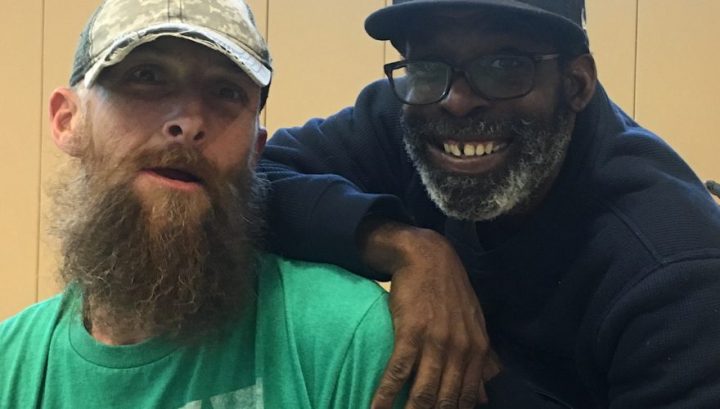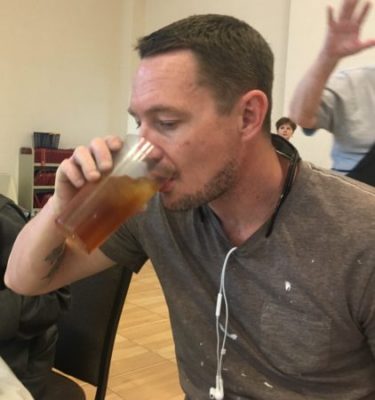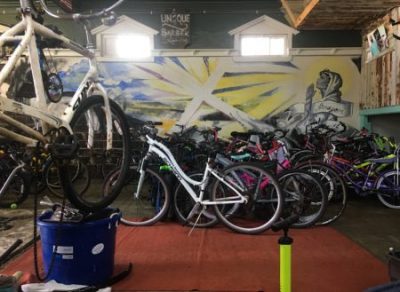
Reprinted from North Carolina Health News
WILMINGTON — When wind and rain slam Wilmington, the racket takes Rose Fanning straight back to the frightening nights she endured during hurricanes Matthew and Florence.
Supporter Spotlight
Fanning, 60, talked about her experiences recently at a Welcome Meal at the city’s Grace United Methodist Church. It’s a weekly offering that brings together diverse kinds of people for food and fellowship.

“It was overwhelming,” she said. “It was traumatic — the rain and the surge and the thunder and the lightning and telephone poles coming down in the street.”
Fanning was among thousands of people touched by catastrophic storms in Eastern North Carolina — Matthew in 2016 and Florence in 2018. A group including students from University of North Carolina Chapel Hill nursing school spent a week in March helping out in eastern counties. They spent part of a day working where Fanning was having lunch, one of the projects of Wilmington’s Anchor church.
Participants in these efforts, whether at a church, clinic or the Anchor’s freewheeling bike shop, seemed determined to steer away from concepts of charity that can create barriers between the helpers and the helped. More creative and empathetic approaches are welcomed here.
“Part of the power and the purpose of this is that this is not a meal for people, but with people,” said Tal Madison, 60, senior pastor of Grace, taking a plate when most others had been fed. “You might have someone who’s very secure in his business, or someone who slept under a bridge last night.”
Supporter Spotlight
Storms hit hard
People who don’t have shelter and those with low incomes show striking, lingering effects of the storms, according to professionals from UNC Chapel Hill and University of North Carolina Wilmington, city clergy and neighborhood volunteers.
“Depression, asthma, diabetes and hypertension often become uncontrolled related to the stress and environmental effects of hurricanes and flooding,” Jean Ann Davison, a family nurse practitioner and clinical associate professor at the UNC Chapel Hill nursing school, wrote in an account of the trip. “And health outcomes can be impacted for years during the recovery period.”
It’s taken an evolving mix of public, private and nonprofit efforts to make a dent in the widespread health and human problems aggravated by the storms. Tamatha Arms, an associate professor of nursing at UNCW, said at the lunch that families she’s encountered continue to suffer financial stress as well as a long list of physical and mental issues.
Blood sugar over 600
“We’ve seen people who have PTSD,” Arms said. “They were people who stayed during the storms, and wished they hadn’t.
“They can experience anxiety, hypervigilance, and nightmares where they wake up in a panic.”
Davison and the nursing students saw more than 200 people at screenings coordinated with meals and health fairs in Lumberton, Wilmington, Burgaw and Dunn. Some of the people they saw had such alarming symptoms that they were sent immediately for treatment.
“We had one woman come in with a blood sugar of over 600,” Davison said in an interview after the trip. “No. 1, they can’t get their medication or they lost their glucometer.
“Your blood sugar gets out of control because you aren’t eating well, and maybe the food you are eating is unhealthy food,” she continued, laying out the steps for someone’s blood sugar to spiral out of control. “They don’t have transportation so they can’t get into see their provider, or the provider may be closed down.”
Nurses said the clients said they were feeling hopeless and asked for prayers for their depression and anxiety.
Another of the diners at Grace, Walter Bannerman, 43, has been sleeping in a tent in an encampment where a number of other unsheltered people stay at night.
“I don’t like rooming houses because they are drug-infested,” Bannerman said after he finished lunch. “You can’t stay clean.”
‘Living in nature’
Staying in the tent can be rough in cold winter or hot summer, he said, but it generally suits him well. He often encounters his forest-dwelling neighbors.
“You got the possums, the coyotes, you got deer,” Bannerman said. “I like it because it’s like living in nature, under God.”
Madison, the pastor at Grace, said the weekly meal has been going on for nearly two years and has cost the church nothing but the use of a fellowship hall and kitchen. Donations, including some from area restaurants, have covered the rest. The Anchor, under the leadership of pastor Philip Chryst, provided the vision for the gathering.
“We serve about 80 to 100 people a week,” Chryst said at the church.
The Anchor, which holds Sunday services in a barge on the Cape Fear River, is also a supporter of Switchin’ Gears, a bicycle shop located in a renovated commercial building in an older neighborhood not far from Grace Church.

Switchin’ Gears does steady business under the leadership of founder and director Dusty Casteen. It also serves as a focus and hangout for people in the up-and-coming neighborhood.
“We try to use a bicycle to start to forge a relationship with people,” Casteen, 38, said as he diagnosed a problem with a customer’s ride. “We’re transforming bikes to try to transform people.”
A steady stream of people and dogs flowed through open doors of the shop. A sign on the building front reads “Miracles Happen Here.” Casteen pointed out that ownership of wheeled transportation means a person who could only function within a few walkable miles can travel 15 miles or so to reach a job, or a medical appointment.
Customers including Bannerman who lend a hand at the shop get $10 credit toward a bike for every hour worked. At one point the Switchin’ Gears crew charged nothing for bikes, but found that the practice could do more harm than good.
Working off bikes
“It kind of evolved,” Casteen said. “First we were giving bikes away, but it turned out people were pawning them for drugs.
“When they work for it, they can pawn it or keep it, it’s kind of up to them.”
Davison and her crew from UNC Chapel Hill bought and donated 100 feet of chain and locks to the shop after hearing that some clients had had their unsecured bikes stolen.
People from the Anchor and the bike shop also set up a shelter at a nearby church to house people during exceptionally cold weather. They learned that giving visitors sleeping bags to take with them, instead of offering a bed with sheets, helped prevent an infestation of bedbugs at the shelter. Casteen, who’s from Wilmington, noted that he acquired his street knowledge first hand.
“I was on heroin for 17 years,” he said. “I got a lot of perception into how to help people.”
How was he able to overcome his addiction?
“I started in Georgia and walked all the way to Maine on the Appalachian Trail,” he said. “That’s how I found God. That really changed my life more than anything, to be honest.”
This story is provided courtesy of North Carolina Health News, a nonprofit news service covering health and environmental issues in North Carolina.







